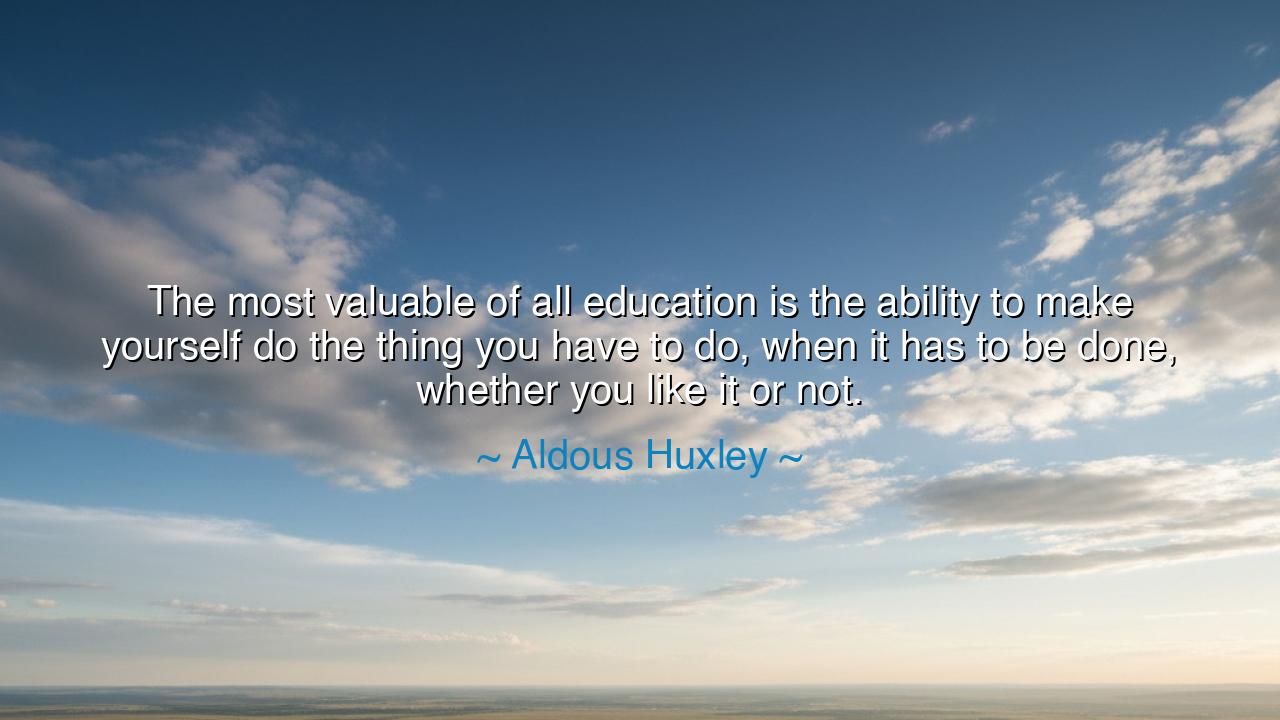
The most valuable of all education is the ability to make
The most valuable of all education is the ability to make yourself do the thing you have to do, when it has to be done, whether you like it or not.






In the profound words of Aldous Huxley, “The most valuable of all education is the ability to make yourself do the thing you have to do, when it has to be done, whether you like it or not.” This saying, though simple on the surface, is a monument of wisdom built upon the foundation of human discipline. Huxley, a man of intellect and insight, saw that all knowledge — art, science, and philosophy alike — is powerless without the strength of self-mastery. The true measure of education, he declared, lies not in the mind’s accumulation of facts, but in the will’s command over the self. For to know what must be done is one thing; to do it, steadfastly and without delay, is the mark of true greatness.
In the ancient schools of wisdom — whether in Greece, Rome, or the East — this truth was the beating heart of learning. The Stoics called it discipline of action; the Buddhists named it right effort; and the sages of every land taught that knowledge without self-control is like a ship without a rudder — destined to drift and founder. Huxley, writing centuries later, revived this ancient truth for the modern age, when comfort and distraction had begun to dull the edge of human resolve. He saw that education, in its highest form, must train not only the intellect but the will — that sacred power which moves men to act rightly even when every impulse pulls them away.
The origin of this insight springs from Huxley’s lifelong contemplation of human weakness and potential. Living in an age of progress and plenty, he warned that ease is the enemy of purpose. For the modern man, he said, had learned to invent machines that could do everything for him — except the one thing that matters most: to govern himself. And thus, Huxley’s quote stands as both a definition and a warning — that the greatest education is not found in books, but in the discipline of the soul.
Consider the example of Thomas Edison, whose life burns as a living parable of Huxley’s wisdom. Edison, driven by relentless curiosity, endured a thousand failures before he discovered the secret of the electric light. Each experiment was a lesson in perseverance; each setback a trial of will. He once said, “I have not failed — I’ve just found 10,000 ways that won’t work.” Here was the spirit Huxley praised — the power to rise and act again, whether one likes it or not. For genius, without discipline, is only potential; it is willpower that turns potential into achievement.
But this wisdom extends beyond inventors and scholars. In the quiet corners of life, every soul faces the same choice — to act or to yield, to endure or to retreat. The student who opens his book when tired, the farmer who works through the storm, the mother who labors without rest — these, too, are masters of Huxley’s teaching. Each time a person chooses duty over desire, they earn a higher kind of education: the mastery of self. For it is not pleasure that refines the soul, but effort; not indulgence that strengthens character, but the steady discipline of doing what must be done.
This is the paradox of true education — it is not only the learning of truths, but the living of them. To act rightly when one’s heart resists; to press forward when the spirit falters; to speak truth when silence is safer — these are the hidden lessons that no school can teach but every life must learn. In this sense, Huxley’s words are a summons to heroism — not the grand heroism of battle, but the quiet heroism of persistence, of daily courage, of self-command.
Let us, then, draw the lesson that Huxley sought to leave for all who would live wisely: educate your will as you educate your mind. When a task appears, meet it; when a duty calls, answer it. Do not wait for the heart to be willing, for willingness follows obedience. Train yourself to act with steadiness and grace, even in discomfort, for that is the path of strength. As the ancients taught, “He who conquers himself is mightier than he who conquers cities.”
And so, remember this truth, passed down from the wise of every age and echoed through Huxley’s voice: the worth of your education is not measured by what you know, but by what you do. Knowledge is the lamp, but discipline is the hand that keeps it burning. When you learn to act rightly — when it must be done, whether you like it or not — then you have become truly educated, and your spirit, at last, is free.






AAdministratorAdministrator
Welcome, honored guests. Please leave a comment, we will respond soon